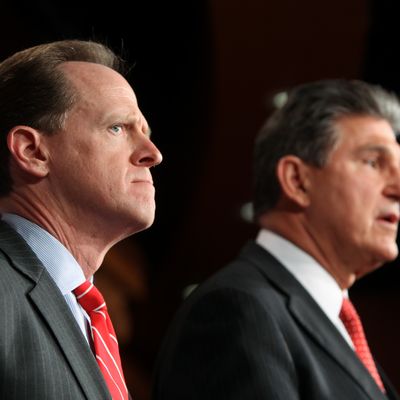
After Al Gore lost the electoral college in 2000 in a way that first revealed the contours of the red-blue divide, the Democratic Party made a strategic decision to abandon gun control as a central plank of its agenda. The Newtown massacre has scrambled that calculation. It forced President Obama to push for a gun-control law he didn’t plan, and the failure of that law has provoked a furious liberal backlash against the consensus that Democrats have to leave guns alone.
John Oliver’s Daily Show segment captures the incredulity many liberals are feeling:
Oliver’s contrast is to the courage of Australian politicians who supported a stringent gun confiscation measure that has created a sea change in that country’s public safety. If senators had a chance to enact a law like that and failed, I think the moral opprobrium they’re facing would make sense. But they were actually voting on a watered-down version of a piecemeal reform, a bill experts described as “a small step,” and which stood a very strong chance of being watered down or killed altogether in the House.
Alec MacGillis, arguing in a similar vein, assails my defense of red-state Democrats who wanted to save their political hides. My argument, he says, “validates obstructionism … demoralizes supporters … lets off the hook the elected officials who had the opportunity to make a substantive improvement to our gun laws.”
Sure. But that’s not the same thing as saying that I’m wrong. You could argue that an elected official should always vote their conscience in every circumstance, and maybe John Oliver would argue that. But almost no successful politicians believe that. And they shouldn’t believe that. There is a real logic that if a Democrat from a red state votes exactly like a Democrat from Vermont, that Democrat is very likely to be replaced by a Republican.
So red-state Democrats have to decide on which issues they should take risks, and on which they should break with their party. A new poll on the background-check bill shows pretty clearly why red-state Democrats had reason to fear supporting the bill. Only 47 percent of respondents said they felt disappointed or angry that it failed, versus 39 percent who felt happy or relieved. Among those paying close attention to the issue, it was tied — which means that, in red states, most of the voters who cared opposed the bill. They may favor background checks in the abstract, but many of them interpreted the issue as a vote on the general idea of gun control, which is much less popular. And the lack of a huge popular groundswell explains in turn why the House would have faced little pressure to pass it, which makes a risky vote in favor even less worthwhile.
Bill Daley, Obama’s former chief of staff, has gotten a lot of attention for this uncharacteristically moralistic op-ed lacerating North Dakota Democrat Heidi Heitkamp as “shameful.”
I was unaware that shame was an emotion Daley was even capable of perceiving. Daley’s usual way of looking at the world is reflected in another Washington Post op-ed, this one from 2009. In it, Daley complained that Democrats in “states such as Indiana, North Carolina, Virginia, Colorado and other Republican bastions” were facing “a grim political fate.” At the time, the primary context of the debate centered on whether Democrats should complete health-care reform or give it up, but also whether it should try to alleviate unemployment or follow through on plans to regulate Wall Street. Daley firmly took the conservative side, urging Democrats to “steer a more moderate course on the key issues of the day, from health care to the economy to the environment to Afghanistan.”
Daley feels enormous moralism about Americans who die of gun crimes, and very little moralism about Americans who die of preexisting conditions they can’t treat or roadside bombs in Afghanistan. The latter must give way to the political viability of red-state Democrats. It turns out Daley does have his red lines, and gun control is one of them (or, more likely, the only one).
Third Way, a self-styled moderate lobby crafting policy and talking points for red-state Democrats, is close to Daley and was founded by a gun-control activist. Third Way’s usual Daley-esque concern with the political viability of vulnerable Democrats gave way to a broadside against “irrationality and fear.” No third way this time!
Just as there is a coherence to John Oliver’s belief that politicians should never compromise their principles to preserve their viability, there is a coherence to the priorities of Daley and Third Way. It’s a vision of the Democratic Party as hewing closely to the agenda of the business lobby; avoiding tough decisions on regulation, taxes, and economic protections for the vulnerable; and using the political capital they husband to stick their necks out as far as possible on gun control.
I’d like Democrats to figure out a way to prevail on gun control and the role of government in the economy. Like Daley, I don’t think Democrats can hold majorities in the red-tilted House and Senate maps by advocating across-the-board liberalism in every race. It makes sense to me to build a gun-control movement that, over time, might shift public opinion to the point that more than marginal improvements are possible. Until such time, the post-Gore strategy of defending gun rights still makes the most sense to me. But that’s the argument the party needs to have.






























